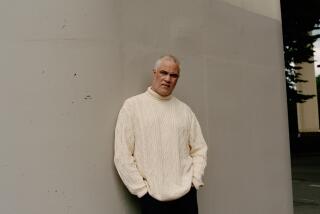ABC’s medical reporter grapples with God
- Share via
It’s not every day that a book about God is recommended by a TV news anchor such as Ted Koppel and by the dean of Harvard’s medical school.
But author Timothy Johnson is no ordinary guy. He studied Protestant theology, switched to medical school, became a Boston physician, then a part-time medical reporter for ABC-TV in 1975 and a full-time one in 1984.
For the last 10 years, Johnson has returned to intense religious study. The result is “Finding God in the Questions: A Personal Journey.”
The book’s first and more interesting part examines whether a modern scientific person like Johnson can believe in God. The second part explores specifics on Jesus, the Bible and the Christian religion.
Johnson’s opening question explores “whether or not it makes intellectual sense to believe that our world is designed by a creator God rather than completely the result of chance.”
In elegantly framed, clear prose aimed at nonscientific readers, he describes the universe in all its mystery, scope and astonishing complexity.
Could all this have appeared by accident? Yes, says Johnson, if there was enough time. But the actual question is whether that’s at all probable, which he doubts. And if there’s design, there must be a designer -- or capital-D Designer. Johnson quotes Sir Fred Hoyle, the eminent astrophysicist who compared random accidents producing higher organisms with the odds that “a tornado sweeping through a junkyard might assemble a Boeing 747.”
Johnson disputes those who think Darwin’s theory of evolution removed the need for a creator as an explanation. Evolution minus God, Johnson concludes, cannot say how living cells developed from nonliving chemicals. Evolution explains only organisms that already exist.
For further support, he summarizes details about water, light, carbon, oxygen and genetic codes, drawing especially from “Nature’s Destiny” by Michael Denton, a New Zealander and an expert in human molecular genetics. He says growing knowledge of nature’s tiniest structures indicates the universe was fine-tuned to produce the human race.
Johnson’s summary: “The more we learn, the less likely it seems that it could all have just happened.’ ”
Johnson finds further support for God in our moral conscience and need for relationships. He judges the existence of moral law a less compelling argument for God than the existence and character of the universe but is convinced that our moral sense can’t simply be attributed to evolution or self-interest.
More to Read
Sign up for our Book Club newsletter
Get the latest news, events and more from the Los Angeles Times Book Club, and help us get L.A. reading and talking.
You may occasionally receive promotional content from the Los Angeles Times.








